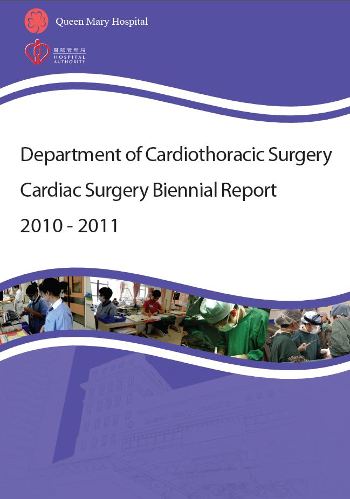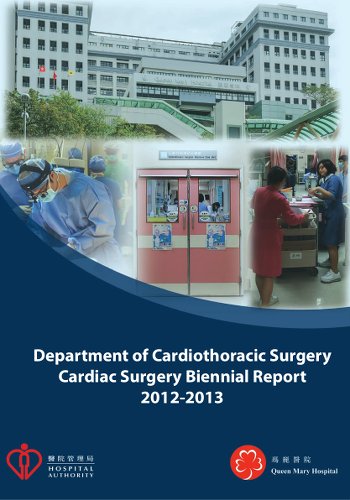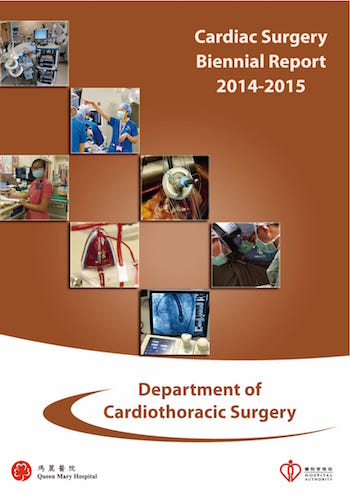Clinical Research
Breast Surgery
Current Research Areas
- Breast and ovarian cancer genetics and epigenetics
- Clinical trials in oncological treatment of breast cancer patients
- Breast Density
- Breast imaging (MRI, PET Scan, Intensive Surveillance)
- Psychosocial issues in Breast Cancer Management
- Partial Breast Radiation
- Molecular Profiling and gene signatures
- Biomarkers in breast and ovarian cancer
- Breast epidemiological studies
Vacancy
The Division of Breast Surgery is open to take in Mphil or phD students for both basic and translational research and also clinical research including psychosocial studies in the area of breast cancer.
For further information to contact avakwong@hku.hk
Cardiothoracic Surgery
Current Research Areas
The Division of Cardiothoracic Surgery has a number of clinical research areas. Current research interest include:
- Minimally invasive cardiac surgery
- Minithoracotomy and ministernotomy for vavlular heart surgery and congenital heart surgery
- Endoscopic long saphenous vein and radial artery harvesting
- Mechanical heart support
- Fully implantable LVAD program as bridge-to-transplant and destination therapy
- Temporary extracorporeal right and left ventricular assist device and bridge-to-transplant and bridge-to-recovery therapy
- Extracorporeal membrane Oxygenation
- VA and VV ECMO program in adults and pediatric patients
- Surgical radiofrequency ablation for atrial fibrillation
- Mitral valve repair programme
- Aortic dissection
- Short-term and long-term surgical outcome
- Heart and lung transplantation
- Risk stratification for adult cardiac patients leading to the establishment of local risk scoring system
- In Thoracic Surgery, a large number of clinical and basic research projects have been initiated with other departments (Department of Pathology and Department of Medicine etc) since 2006, including:
- Molecular genetic, proteonomic and stem cell research in Lung Cancer amongst Hong Kong patients.
- Investigation of novel techniques to treat air leakage in lung resection surgery, including the use of endoscopic application of aerosolized fibrin.
- Identification of different components of post-operative pain following thoracic surgery, and development of novel strategies targeting individual components such as neuropathy.
- Prospective surveys into the quality of life following thoracic surgery, with specific analysis of influences from elements of peri-operative care, socio-economic factors, and pain.
- Continuing evaluation of operative efficacy, enhancement of post-operative recovery, and long-term outcomes following minimally invasive thoracic surgery.
- Current Prospective Research Projects in Thoracic Surgery
- Lung Cancer Molecular Genetics and Clinico-pathological Correlations study (in partnership with The University of Hong Kong Department of Pathology)
- Lung Cancer Tissue Banking for Proteonomics research (in partnership with The University of Hong Kong Department of Surgery)
- Viral and Microbial Markers in Lung Tissue in Hong Kong (in partnership with The University of Hong Kong Department of Microbiology)
- Lung Cancer Stem Cell research (in partnership with The University of Hong Kong Department of Medicine)
- Aquaporin-4 Expression in Thymic tissue in patients with Thymoma and/or Myasthenia Gravis (in partnership with The University of Hong Kong Department of Medicine)
- Tumor Markers for Lung Cancer in Sputum (in partnership with The University of Hong Kong Department of Medicine)
- Lung Cancer Systemic and Airway Cytokines (in partnership with The University of Hong Kong Department of Medicine)
- Pharmaco-physiological Characteristics of Pulmonary Vasculature in Lung Malignancies (in partnership with The University of Hong Kong Department of Pharmacology)
- Randomized Placebo-Controlled Trial on use of Gabapentin for the management of Post-Thoracotomy Pain Syndrome
- Prospective survey on Patient Morbidity from Chest Drain use following Thoracic Surgery
- Use of novel Needlescopic VATS Pleurodesis technique for Primary Spontaneous Pneumothorax
- Cardiac Surgery Biennial Report
Colorectal Surgery
Current Research Areas
The Division actively engages in both clinical and laboratory-based research. Current research interest includes:
- Colorectal Cancer
- Total mesorectal excision for rectal cancer
- Adjuvant therapy for colorectal cancer
- Laparoscopic surgery for colorectal cancer
- Bowel function after rectal cancer surgery
- Hereditary colorectal cancer
- Relationship between anastomatic leakage and cancer recurrence
- Laparoscopic versus open surgery for metastatic colorectal cancer
- Screening for high risk families
- Cancer genetics
- Intestinal obstruction
- Prospective audit on surgical outcome
- Colonoscopy
- Colorectal polyps
- Natural Orifice Transluminal Endoscopic Surgery
- Robotic surgery
- Hernia surgery

Surgical Skills Centre, Faculty of Medicine Building, Sassoon Road
Endocrine Surgery
Current Research Areas (Clinical and laboratory)
- Clinicopathologic studies of thyroid carcinoma
- Cycloxygenase in thyroid carcinoma
- VEGF-C, p16, CDK4 and TGFa in thyroid cancer
- Ret-PTC oncogene expression in papillary thyroid carcinoma
- Somatic polymorphism in thyroid cancer
- Arterial stimulated venous sampling for preoperative localization of pancreatic insulinomas
- Sequential chemotherapy combined with hepatic artery embolization for metastatic insulinomas
- Multiple endocrine neoplasia in Chinese : clinicopathologic and genetic study
- Preoperative localization using ultrasonography and sestamibi scanning for primary hyperparathyroidism
Esophageal and Upper Gastrointestinal Surgery
Current Research Areas
The Division is active both in clinical and laboratory basic research, the results of which are published regularly in high impact factor international journals, and also presented in local and international meetings. Recent examples of published and on-going projects include:
- Studies on factors affecting morbidity and mortality after esophagectomy
- Use of minimally invasive techniques in esophagectomy
- Implications of neoadjuvant chemoradiation on staging of esophageal cancer
- Use of Cox-2 inhibitor to enhance response from chemoradiation for esophageal cancer
- Influence of technical complications on long-term prognosis after esophagectomy
- Use of self-expanding metallic stents in palliation of patients with esophageal cancer
- Positron-Emission-Tomography scan in staging for esophageal cancer and assessment of response after neoadjuvant chemoradiation therapy
- Endoscopic ultrasound in staging esophageal and gastric cancer
- Minimally invasive surgery in treating achalasia
- Molecular, genomics and proteomics approaches in study of esophageal, gastric cancer, gastrointestinal stroma tumors and lymphoma
- Establishment of novel esophageal cancer cell lines
- Gastroesophageal reflux disease
- Biomarkers and prognostic significance in esophageal cancer
- Foreign body ingestion
- Peptic ulcer diseases and their complications
- Helicobacter pylori infection
- Surgical education
General Surgery
- Ambulatory Surgery
- Minimal invasive surgery
- Hernia surgery
- Integration of Chinese and Western Medicine
Head & Neck Surgery
Current Research Areas
Staff of the Division actively participate in both clinical and laboratory research. Some of our current research interests include the following:
- Anatomical study and clinical applications of free posterior tibial flap
- The application of PET-CT scan and plasma EBV-DNA level in patients with recurrent nasopharyngeal carcinoma
- Various approaches in the management of recurrent nasopharyngeal carcinoma
- The use of narrow band imaging in the surveillance of Head and Neck cancer
- Genetic and epigenetic alterations of head and neck cancers
- Gene polymorphism and risk of recurrent nasopharyngeal carcinomas
- Molecular cancer detection with DNA, RNA, and micro-RNA markers
- Cancer stem cells and chemoresistance
- Epstein-Barr virus activities in undifferentiated nasopharyngeal carcinomas
- Use of natural polyphenols in cancer prevention and treatment
- Epigenetic alterations in laryngeal carcinomas
Hepatobiliary Surgery
Liver cancer
- Surgical techniques in hepatic resection for liver cancers
- Radiofrequency ablation of hepatocellular carcinoma and liver metastasis
- Transarterial chemoembolization for hepatocellular carcinoma using novel chemotherapeutic agent
- Novel systemic chemotherapy and targeted therapies for metastatic hepatocellular carcinoma
- Hepatitis B activities and hepatocellular carcinoma
- Postoperative adjuvant therapy after curative resection of hepatocellular carcinoma
- Identification of biomarkers for hepatocellular carcinoma
- Genome-wide expression study of liver cancer by cDNA microarray
- Angiogenesis and hepatocellular carcinoma
- Novel anti-cancer strategy for hepatocellular carcinoma
Liver transplantation
- Living donor liver transplantation using right lobe graft with inclusion of middle hepatic vein
- Clinical implications of small for size graft in right lobe living donor liver transplantation
- Liver transplantation for acute-on-chronic liver failure
- Use of monotherapy antiviral medication for post-transplant prophylaxis against HBV recurrence
- Salvage liver transplantation for recurrent hepatocellular carcinoma
- Prevention and management of biliary complications after living donor liver transplantation
- Role of high intensity focused ultrasound as bridging treatment for patients with hepatocellular carcinoma enlisted for liver transplantation
- Rescue living donor liver transplantation for post-hepatectomy liver failure
- Long-term outcomes and quality of life of living liver donors
- Randomized trial of hepaticojejunostomy versus duct-to-duct anastomosis in right lobe living donor liver transplantation
- Prospective trial on sexual dysfunction of male adult recipients pre- and post-liver transplantation
- A one-year prospective open label study of the safety and efficacy of Certican (everolimus)-based regimen in maintenance of liver transplant recipients
Endoscopic and Laparoscopic Surgery
- Laparoscopic and endoscopic ultrasonography
- Laparoscopic hepatic resection for liver cancers
Others
Pancreatic duct drainage after pancreaticoduodenectomy
Clinical Trials
The Division of HBP Surgery is conducting clinical trials on new treatments for liver cancer, ranging from adjuvant therapy after resection of early liver tumours to molecular targeted therapy for advanced liver cancer. These new treatments aim to improve the survival outcome of liver cancer patients. Some of these clinical trials are sponsored by pharmaceutical companies and the drug treatments are free of charge. The trials are approved and monitored by the Institutional Review Board of Queen Mary Hospital.
Examples:
Adjuvant Trials after Liver Surgery- Phase III trial of PI-88 for patients with hepatitis virus related HCC after surgical resection
- A Phase III trial of ThermoDox in combination with radiofrequency ablation compared to RFA alone in treatment of non-resectable hepatocellular carcinoma
- A Phase III trial of ThermoDox in hepatocellular carcinoma using standardized radiofrequency ablation treatment time ≥45 minutes for solitary lesions ≥3cm to ≤7cm
- Randomized controlled trial of TOCE plus PVE vs PVE alone before major hepatectomy for patients with HCC
- Associating Liver Partition and Portal Vein Ligation for Staged Hepatectomy (ALPPS) for insufficient future liver remnant: a pilot study
- Prospective evaluation of intraoperative indocyanine green retention rate during major hepatectomy
- Phase III trial of brivanib versus placebo as adjuvant therapy to TACE in patients with unresectable HCC
- Phase II trial of DEB-TACE combination of oral everolimus (RAD001, Afinitor®) in localised HCC
- High intensity focused ultrasound (HIFU) combined with TACE versus TACE alone for unresectable HCC
- Phase II trial of TKI258 versus sorafenib as first-line treatment in adult patients with advanced HCC
- Phase III trial of selective internal radiation therapy (SIRT) versus sorafenib in locally advanced HCC
- Phase II trial of axitinib plus best supportive care (BSC) versus placebo plus BSC in patients with advanced HCC
- Phase III trial of everolimus (RAD001) versus placebo in patients with advanced HCC
- Phase III trial of brivanib plus BSC versus placebo plus BSC in patients with advanced HCC
Neurosurgery
Our team conducts a wide range of projects on clinical neurosurgery, ranging from traumatic brain injury, neuro-oncology and cerebrovascular surgery. Apart from studies on surgical techniques and patient care relevant to daily practice, we have also established research platforms that focus on the adoption of advanced medical technology and novel approaches towards disease diagnosis and treatment.
Recent clinical studies include:
Collaboration with UCSF studying brain tumour genomics, our research findings could potentially alter the understanding and management of patients with meningioma.
Publication
Choudhury A, Magil ST, Eaton CD, Prage BC, Chen WC, Cady MA, Seo K, Lucas CG, Casey-Clyde TJ, Vasudevan HN, Liu SJ, Villanueva-Meyer JE, Lam T, Pu JK, Li L, Leung GK, Swaney DL, Zhang MY, ChanJW, Qiu Z, Martin MV, Susko MS, Braunstein SE, Bush EAO, Schulte J, Butowski N, Sneed PK, Berger MS, Krogan NJ, Perry A, Phillips JJ, Solomon DA, Costello JF, McDermott MC, Rich JN, Raleigh DR. Meningioma DNA methylation grouping reveals biologic drivers and therapeutic vulnerabilities. Nature Genetics. 2022.
Collaboration with Professor Ed X Wu Electrical and Electronic Engineering (HKU) to develop a low-cost and ultra-low-field brain MRI scanner with the potential of broadening patient access to diagnostic imaging studies.
Publication
Liu Y, Leong ATL, Zhao Y, Xiao L, Mak HKF, Tsang ACO, Lau GKK, Leung GK, Wu EX. A low-cost and shielding-free ultra-low-field brain MRI scanner. Nature Communication. 2021.
Collaboration with Statistics and Actuarial Science (HKU) to develop a machine learning platform for the diagnosis of acute ischaemic stroke.
Publication
You J, Tsang ACO, Yu PLH, Tsui ELH, Woo PPS, Lui CSM, Leung GK. Automated hierarchy evaluation system of large vessel occlusion in acute ischemia stroke. Frontiers Neuroinformatics. 2020.
Clinical trial projects
There are on-going clinical trials:
1. Impact of cranioplasty on cerebral perfusion and cognitive outcome
2. Impact of ultra-early aneurysm
3. Efficacy of atorvastatin in chronic subdural hematoma
Otorhinolaryngology
Current Research Areas
The research focus is on allergic rhinitis, paediatric cochlear implant, otologic and rhinologic complications of radiotherapy, speech and swallowing rehabilitation, Head and Neck cancer especially nasopharyngeal cancer, TORS transoral robotic surgery.
Paediatric Surgery
Current Research Areas
The Division is active in both laboratory and clinical research. Our research focuses on the elucidation of the molecular mechanisms of congenital disorders and cancer biology. With a better understanding of these diseases, effective treatments shall be developed.
Examples of some research projects:
I. Clinical
-
Clinical studies of Hirschsprung’s disease, anorectal malformation, biliary atresia, choledochal cyst and other index conditions.
-
Effects of thoracic surgery in childhood.
-
Long-term outcomes and quality of life
II. Laboratory
-
Molecular genetic study of Hirschsprung's disease and other related neurocristopathies, and biliary atresia
-
Cancer study and therapy and stem cells
-
Nanomedicine in wound healing and regeneration
Plastic & Reconstructive Surgery
Current Research Areas
Current research projects undertaken by the Division include:
- Treatment of hypertrophic scar and keloid.
- The use of allograft skin in the treatment of large area burns.
- Study on the pigmented cutaneous lesions in orientals.
- The clinical results of flap surgeries in head and neck reconstruction.
Vascular Surgery
Current Research Areas
Staff of the Division actively participates in clinical and laboratory research and has extensive publications in international scientific and medical journal, and has received RGC and other external grants in vascular surgery studies. Current research interests include:
- Endovascular aortic stent graft technology
- Aortic dissections and endovascular treatment
- Computational fluid dynamics and aortic morphology
- Three dimensional imaging and aortic stent grafts
- Pathogenesis of aortic aneurysms
- Atherosclerosis and atherogenesis, apoptosis, and lipid studies
- Cryobiology
- Epidemiology of peripheral arterial and venous disease
- Carotid disease progression, plaque morphology and biology
- Venous insufficiency and quantitative venous hemodynamics
Urology
Major Research Areas
- BPH management
- Tumorigenesis of urological cancer
- Diagnostic tools of prostate cancer
- Management of early prostate cancer with robotic surgery and metastatic prostate cancer with novel pharmacological agents
- Management of kidney cancer, including partial nephrectomy for small renal mass and radical nephrectomy with caval thrombectomy for locally advanced disease
- Female urology
- Minimally invasive management of urinary calculi
- Ketamine cystitis















